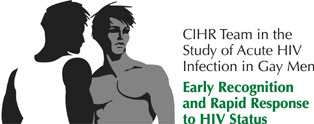
Funding Provided By
Overview of the Study
People newly infected with HIV are at their most infectious phase but mostly unaware of their infection status at this time. This is because current screening tests for HIV infection are unable to identify persons in this phase as being infected. Fortunately, new laboratory testing methods can now detect HIV infection at a much earlier stage. This makes it possible to offer programs to these early infected individuals, including professional and peer counselling, as well as support to prevent transmission of HIV to others. For more information on these testing technologies, please see the section on “What is Acute HIV Infection?”
Our team of researchers formed to work with the gay community in British Columbia to strengthen prevention programs for persons with new infections and for HIV-negative men from this community. There were two cohorts in this study: an HIV-positive and HIV-negative. The team members are from the biomedical sciences, public health, social sciences, and researchers based in the community.
The HIV-Positive Cohort
This study explored:
• Gay men's understanding of HIV testing
• Gay men’s motivations and challenges in taking an HIV test
• The impacts of new testing technologies that are able to identify persons with acute infection, on gay men’s testing practices.
In collaboration with our community partners, the research team translated this information to design health messages that encourage gay men in BC to get tested for HIV. A key aim of this study was to transfer evidence-based knowledge around HIV testing and acute HIV infection to the community in order to increase community awareness and uptake of HIV testing advances.
In addition, this study investigated:
• Gay men’s psychosocial needs at the point of an HIV-positive diagnosis
• The psychosocial impact of acute HIV infection and effective support for gay men who were acutely infected
Men diagnosed with acute or early HIV infection were offered a confidential counselling session with a professional counsellor to talk about how they were feeling and to answer any questions that they had. After this session, the newly diagnosed person was offered participation in the study, and upon their informed consent, interviewed to better understand their needs in order to fine tune the prevention programs. Information was provided about other supports available, including peer counsellors who they could meet on an on-going basis.
